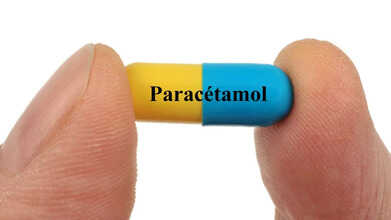- Health Conditions A-Z
- Health & Wellness
- Nutrition
- Fitness
- Health News
- Ayurveda
- Videos
- Medicine A-Z
- Parenting
- Web Stories
‘Mounjaro Stole My Booty’: Woman Who Lost 84 Pounds Reveals Nasty Side Effects Of The Weight Loss Drug

Credits: TikTok/@Bethany Diana
In recent years, weight loss injections such as Mounjaro (tirzepatide) have become extremely popular worldwide, promising quick and dramatic weight loss. Nevertheless, even though these medications bring much-needed hope to many who have issues with obesity and diabetes, the journey is normally not without difficult side effects. A 27-year-old British woman named Bethany Diana has spoken openly about her life-changing though tough journey when she lost 84 pounds in nine months on Mounjaro, highlighting the usually unspoken negative aspects of this weight loss medication.
Bethany's tale is inspiring. She lost six stone (84 pounds) and transformed from a size 18 to an eight, a change of body that has obviously increased her self-esteem and general well-being. On her TikTok handle (@bethanydianax), where she has gained over 75,000 likes, she gives her journey publicly, hoping to motivate people. Bethany says she is "such a better version" of herself after losing six stone (84 pounds).
Mounjaro's weight loss effects are documented. The drug, initially created to control type 2 diabetes, functions by imitating hormones that control hunger and blood sugar. Patients will usually feel fuller for a longer time, which, understandably, results in eating less and, as a consequence, weight loss. The NHS does caution, however, that Mounjaro is only to be prescribed to diabetes and certain specific medical needs patients, and that off-label usage to aid weight loss is cautioned against.
The Unpleasant Side Effects No One Talks About
Even in success, Bethany did not hold back from sharing the less glitzy details of her weight loss process. In a viral TikTok video that received over 100,000 views, she enumerated the side effects she had:
- Diarrhea, a typical gastrointestinal issue.
- Bad breath, one of the lesser-known but unpleasant symptoms.
- Hair loss, which she suffered but did not elaborate on at length.
- "Sulphur burps" – rotten egg-smelling burps caused by hydrogen sulfide gas within the gut.
- Constipation, nausea, heartburn, wind, and acid reflux.
Bethany's honesty provides a vital insight into the drug's effect other than weight loss figures, acknowledging that the journey to change can be painful and even traumatic.
One of the very noticeable grievances Bethany recounted was that "Mounjaro stole my booty." This expression summarizes a grievance often expressed by users of weight reduction pills — sagging or loss of volume in the buttocks and other places caused by rapid fat loss.
Quick weight loss can cause flabby skin and body reshaping that others will not find attractive or easy to accept. Though Bethany recognizes the transformation, she weighs it against her overall experience and confirms that her side effects were "temporary" but the weight loss was "for life."
Bethany's honesty resonated on social media. Several viewers posted their own side effects, corroborating her experience and generating a community conversation about the drug's impact:
One viewer wrote, "It's the sulphur burps and nausea I find hardest, especially when barely eating." Another confessed, "I had bad breath too, didn't know it was due to the injection." Others described milder effects such as constipation.
Though Bethany's tale comes to a positive end despite the side effects, note must be taken of the safety issues that accompany weight loss and diabetes shots such as Mounjaro and Ozempic. The UK Medicines and Healthcare Products Regulatory Agency (MHRA) has noted more than 80 fatalities attributed to these drugs since they began more extensive use, with 22 deaths that directly involve tirzepatide.
A notably sad example is that of Susan McGowan, a 58-year-old Lanarkshire nurse, who passed away from multiple organ failure and pancreatitis after receiving only two low-dose injections of tirzepatide. Her death was the first to be recorded with this drug as a contributory factor on a death certificate, leading to increased vigilance.
The NHS has since released clear messages cautioning patients never to take anti-obesity drugs without a prescription and under medical guidance, highlighting the risks of unmonitored usage.
Bethany's tale summarizes the promise and the dangers of weight loss injections such as Mounjaro. The medication provides a powerful tool for shedding pounds, especially for individuals with type 2 diabetes or obesity-related complications. But it also comes with a range of side effects — from transient gastrointestinal upset to more serious health threats.
Individuals who contemplate such medications should speak to healthcare providers, carefully consider pros and cons, and be on guard for side effects. Weight loss is a personal, multifaceted experience, and an approach that benefits one may not appeal to another.
The rapid rise of Mounjaro and other drugs signals a shift in how obesity and diabetes are managed with pharmacology paired with lifestyle modification. Further studies are required to learn more about long-term consequences, achieve optimal dosing, and create safer protocols.
Paracetamol Should Not Be Mixed With These Medications, Doctors Advise

Credits: Canva
The NHS has issued a warning for anyone using a common painkiller, highlighting possible harmful interactions with other medications. Across the UK, many people turn to over-the-counter medicines for daily aches, colds, and minor illnesses. Among these, paracetamol is one of the most widely used, often taken for headaches, back pain, and cold symptoms. But, like any medication, it carries certain risks.
Who Should Be Careful?
The NHS has provided guidance on using paracetamol safely, including which drug combinations should be avoided. “Paracetamol is not suitable for some people,” the health body explains. This includes individuals who take warfarin, a drug that prevents blood clots. If you are on warfarin, you should check with your GP before taking paracetamol, the NHS advises. “Paracetamol can raise the risk of bleeding in those who regularly take warfarin.”
Safe Dosing Guidelines
Small doses of paracetamol alongside warfarin are generally considered safe. The NHS adds: “It’s safe to take paracetamol if you’re on warfarin. Stick to the lowest dose that relieves your pain. Exceeding four 500mg tablets in 24 hours for more than a few days can slow your blood clotting, putting you at risk of bleeding.”
Avoid Double Dosing
Combining paracetamol with other medicines containing the same ingredient—like co-codamol or some cold and flu remedies—can be risky due to the danger of overdose. Other common painkillers, such as ibuprofen, aspirin, or codeine, do not contain paracetamol and can safely be taken at the same time.
Check with Your Doctor
The NHS advises consulting a doctor before taking paracetamol if you’re on medications for epilepsy or tuberculosis (TB), as these combinations can also pose risks.
Herbal Remedies and Supplements
Generally, paracetamol is not affected by herbal supplements, though the NHS notes: “There isn’t enough information to say whether herbal remedies, complementary medicines, or supplements are safe with paracetamol. They are not tested the same way as prescription or pharmacy medications and may interact differently.” Patients should inform their doctor or pharmacist about any other medicines or supplements they are taking.
Side Effects of Paracetamol
When taken at the recommended dose, paracetamol “very rarely” causes side effects. For a full list, refer to the information leaflet inside the packaging.
Serious Allergic Reactions
In rare cases, a serious allergic reaction (anaphylaxis) can occur. The NHS advises calling 999 immediately if you notice:
- Swelling of lips, mouth, throat, or tongue
- Rapid or labored breathing, wheezing, or a choking sensation
- A tight throat or difficulty swallowing
- Skin, lips, or tongue turning blue, grey, or pale (on darker skin, check palms or soles)
- Sudden confusion, extreme drowsiness, or dizziness
- Fainting and unresponsiveness
- A child appearing limp, floppy, or unresponsive, with difficulty lifting or focusing their head
Do You Zone Out Often? Study Finds This May Be A Way For Your Brain Do 'Maintenance'

(Credit-Canva)
That sudden, foggy feeling where you can't focus, especially when you're super tired? New research suggests that these moments of zoning out are actually your brain's last-ditch effort to do the important cleaning it normally saves for when you're fast asleep. Your brain is trying to take a quick, emergency break.
We have all had days when focusing seems too difficult and you keep ‘spacing out’. When this happens, you take a moment to regain your composure and get back to what you were doing. While you may think that it is a simple lapse in attention, there is a lot that happens in your brain during this time.
The research, published in the Nature Neuroscience, shows this is the time your brain does its ‘maintenance work’ to ensure maximum functionality.
Why Do We Zone Out?
Scientists at MIT used special scanners to look deep inside the brain while people were trying to concentrate. They discovered that the exact moment someone zoned out, a wave of cerebrospinal fluid (CSF), a clear fluid that surrounds the brain, whooshed out, and then flowed right back in. This movement of fluid looks exactly like the process that happens during deep sleep, when the fluid washes away built-up waste and toxins from the day. When you're awake and tired, your brain is trying to force this cleaning process to happen.
How Does Our Brain Keep Functioning Fluidly?
A leading neuroscientist from the study explained that if you skip sleep, these cleaning waves start happening while you're awake, even though they shouldn't. The problem is that while the fluid is flowing and cleaning, you lose your ability to pay attention. It's a trade-off: your brain tries to clean up, but the price is that you can't focus on what you're doing. It’s almost like your brain is desperately trying to squeeze in a tiny bit of "microsleep" maintenance, which steals your focus.
The researchers had people do tests in the lab twice: once after they were well-rested, and once after they stayed up all night. Unsurprisingly, people performed much worse when they hadn't slept. Critically, the zoning out happened far more often after the all-nighter. When they looked at the brain data, they saw a clear pattern: when people's reaction times slowed down (meaning they were zoning out), the big fluid cleaning waves were always present. This strongly suggests your tired brain is trying to use these quick cycles to restore function, even if it makes you temporarily lose focus.
How Do We Know When We Zone Out?
The research revealed that when people zoned out, not only did the brain fluid move, but other things changed, too. Their breathing and heart rate slowed down, and their pupils got smaller. This makes the scientists suspect that a single, powerful "master switch" in the body controls both your high-level functions (like attention and perception) and these automatic, basic physical processes (like fluid movement and heart rate). The finding suggests that a lack of sleep affects your whole body through one central system.
Your Daily Work 'Grind' Is Ruining Your Heart Health, Cardiologist Explains How These Daily Habits Affect Your Heart

(Credit-Canva)
Recently, we are seeing a rise in ‘grind culture’. People are encouraged to pack their days with work and be as productive as possible to secure future success. However, did you know that chasing this success could come at the cost of your heart's health? Dr. Dmitry Yaranov, MD, a cardiologist, who often shared important health advice and knowledge on Instagram videos, explained posted about how as a practicing healthcare professional, there are many heart facts that he wished his patients knew about.
Things we often perceive as important for our careers can come at the cost of our mental and physical health. By not realizing the value of their health and ignoring their limits, people often stretch themselves too far, which can result in reaching a breaking point.
In a recent video posted with the text, “After treating thousands of patients with heart failure this are the things I wish more people knew before it was too late” in the caption he listed 6 hard facts that most people ignore.
6 Habits That Are Leading You To Heart Failure
In the caption Dr. Yaranov explained that cardiovascular health involves much more than just hitting the gym and eating salads. Your heart health is fundamentally tied to sleep, stress management, environmental factors, access to resources, and even the state of your gut. Fix the foundation, not just the numbers.
Sleep Deprivation is Dangerous
Sleeping only six hours nightly and pushing yourself is a serious threat, not a badge of honor. This chronic sleep loss significantly raises your long-term risk of developing severe conditions like heart failure, having a stroke, or experiencing sudden cardiac death. Your body needs rest to recover.
Air Quality Hardens Arteries
Commuting daily in heavy traffic means breathing exhaust and particulate matter. This consistent exposure to air pollution does more than irritate your lungs; scientific studies confirm it literally hardens your arteries, increasing your risk for major cardiac events over time.
Stress Causes Overload
If you are always stressed and simply "pushing through" without managing the pressure, your body is producing too much cortisol. This hormonal overload leads to persistent high blood pressure and widespread inflammation, key factors that severely damage the cardiovascular system.
Gum Health Impacts Heart Health
Ignoring routine dental care and having gum disease creates chronic infection in your mouth. This persistent gum disease results in more body-wide inflammation, which is directly linked to a significantly higher risk of heart attack and other cardiovascular problems.
Food Access Matters
Even if you have the best intentions to eat well, living where healthy food is hard to find (a food desert) makes it difficult. This lack of access to nutritious options leads to worse cardiac outcomes, proving that environment, not just personal willpower, shapes your health.
Gut Health Affects Vital Signs
The state of your digestive system should not be ignored. The millions of bacteria in your gut microbiome play a critical, unrecognized role in helping your body regulate blood pressure and cholesterol levels. You must consciously feed your gut bacteria the right way.
© 2024 Bennett, Coleman & Company Limited

